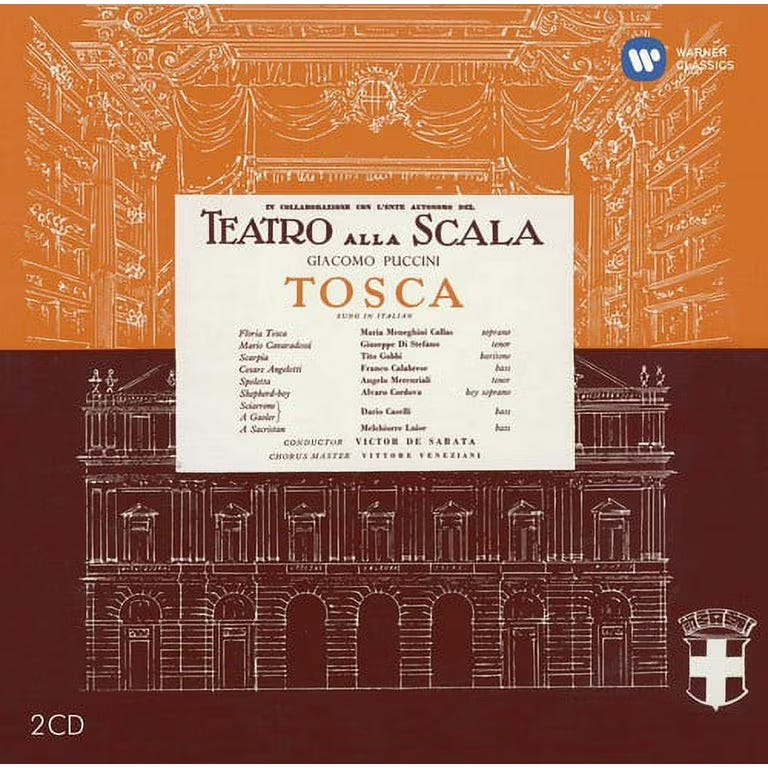Genre of the Day - Verismo
Album of the Day - Teatro alla Scala: Tosca by Giacomo Puccini (Debuted 1900; recording in 1953)
There are few experiences more universally seen as highbrow than going to the opera, even if today tickets to a showing really aren’t much more than any other large-venue concert due to the evils of music-biz monopolies. The Los Angeles Opera, for example, offers $30 tickets for those under 30. Even so, an inaccessibility and general bougieness is attributed to the opera in the popular imagination: we envision opera-goers in their minks and squinting through gilded viewing glasses. Given that most popular operas are in German or Italian, many shy away from attempting to surmount this linguistic barrier for the purpose of entertainment. But opera has never been exclusively for or about the genteel and rich, and our exploration of opera buffa already poked holes in these stuffy notions. A musical institution as rich and storied as opera has altered its expression corresponding to wider political and social shifts. There is no better example than verismo, opera’s raw and shrewd turn in the late 1800s.
Verismo translates to realism, a succinct title for a genre of opera that emerged as composers peeled back the excesses of Romanticism as a part of the wider European literary and artistic pivot towards realism. Through the 1800s, the Napoleonic Wars, industrialization’s rise, and chaotic, violent work of sewing together political entities that had distinctively existed for centuries into conceptual nation-states as in the unifications of Germany and Italy rendered populuses disaffected. As the century progressed, artists sought to capture this sense of flux with naturalistic approaches. Operas had usually revolved around royals or fantastical archetypes; many verismo libretti, by contrast, undertook the radical effort of exploring the lives of the poor and rural folk.
In alignment with these thematic ideals, verismo deviated slightly in compositional structure. Composers incorporated popular and folk songs, made the interchange between the orchestra and the voices more conversational and free, and demanded even more passionate vocal performances of its singers by imbuing their timbres with punchy emotion. Realism doesn’t imply a lack of drama; it is still the opera, after all. Though there’s some debate as to how much verismo constitutes a genre of its own as opposed to a short-lived chapter of stylistic preferences, its impact is undeniable: the verismo La Bohème, for example, directly inspired the Broadway hit Rent in its portrayal of an artistic community suffering from poverty and disease.
Rent debuted exactly a century after the debut of Giacomo Puccini, the patron saint of verismo’s La Bohème. Today’s opera lifted its curtains precisely one hundred years after the chaos that occurred in 1800 it portrays, as Napoleon’s army swept into Rome and temporarily decapitated the Papacy. Puccini’s La Tosca follows the ill-fated love affair between diva Floria Tosca and painter Mario Cavaradossi as they fall into the political and perverse schemes of the police chief Baron Scarpia. The trip to the opera as in this acclaimed 1953 recording envelops you completely in its thrills and tragedies. Soprano Maria Callas, a figure bearing a voice as complex and uniquely carved as the tenets of verismo itself, embodies a diva in distress with razor-sharp clarity as in “Ed io venivo a lui tutta dogliosa.” The composition is simply riveting—the stirring push and pull between contemplative pauses and the singers’ deftly summoned emotional bursts, colored by swells of strings, from the first few songs of Act I is capturing. Through the shocks and intrigues of Act II and lamenting dirges of Act III, the precision shines through: in striving to be as real as possible, Puccini wasted no efforts and had fashioned the bells of the original production to match the exact tone of those in the Castel Sant’Angelo prison the opera partly takes place in. This recording does that dedication justice in its superb balance of theatricality and dynamic, unpredictable pacing that mirrors our own dramas, elevated to one of the most fine-tuned musical platforms.




